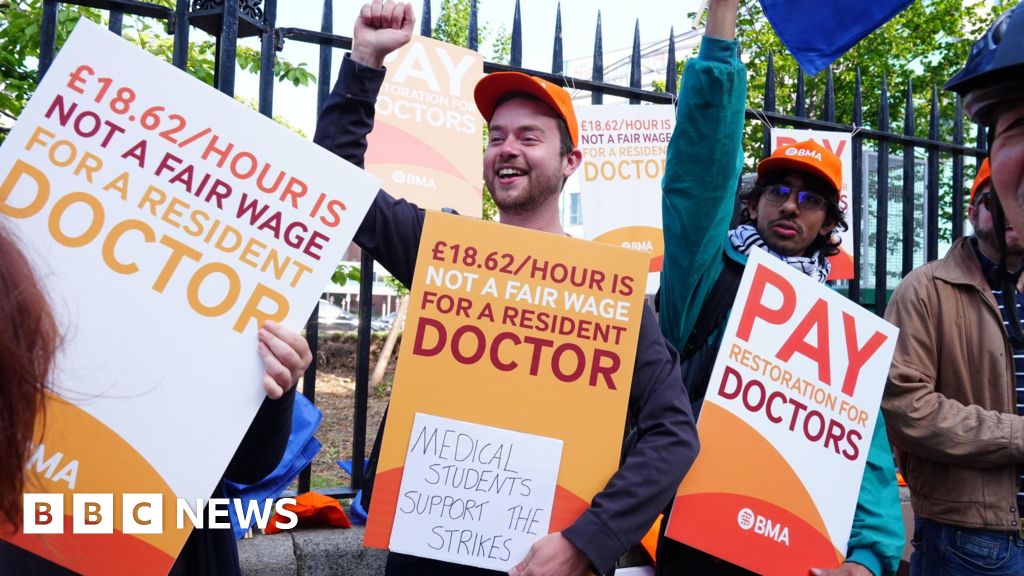Health correspondent
Health Secretary Wes Streeting is promising to keep NHS services running as a five-day walkout by resident doctors gets underway in England.
He said the disruption would be kept to a minimum after NHS England ordered hospitals to only cancel treatments in exceptional circumstances.
In previous strikes, the focus has been on staffing emergency care but this time the NHS is striving to keep non-urgent services running. Senior doctors are covering resident doctors – the new term for junior doctors who are striking – for the 12th time in the pay dispute.
The British Medical Association warned that this risks stretching staff too thinly, saying ministers had every opportunity to stop the walkout.
Writing in the Times ahead of the strike, Prime Minister Sir Keir Starmer urged resident doctors not to follow their union down the “damaging road” of strike action.
Despite the efforts being put in by NHS leaders, he said the walkout would cause a “huge loss for the NHS and the country,” as he criticised the British Medical Association (BMA) for “rushing” into strikes.
Sir Keir said the walkouts threatened “to turn back the clock on progress we have made in rebuilding the NHS over the last year”.
Streeting said: “There is no getting around the fact that these strikes will hit the progress we are making on turning the NHS round.”
But he added: “I am determined to keep disruption to patients to a minimum.”
Members of the public have been urged to come forward for NHS care during the walkout, and are being asked to attend appointments unless told they are cancelled.
GP surgeries will open as usual, and urgent care and A&E will continue to be available, alongside NHS 111, NHS England said.
The strike is going ahead after talks between the government and BMA broke down on Tuesday.
Those talks were focused on non-pay issues, such as the cost of exam fees and career progression, after Streeting had said pay was not open to negotiation.
The BMA says, despite a 5.4% average pay rise this year following a 22% increase over the previous two years, pay is still down by a fifth since 2008, once inflation is taken into account.
During their first foundation year after finishing their medical degree resident doctors in England now earn a basic salary of £38,831, for an average of 48 hours worked per week. In the second year, this rises to £44,439. By the end of training salaries exceed £73,000.
Medics are often expected to work nightshifts, weekends and longer hours for extra payments. On average these top up their earnings by more than a quarter.
BMA resident doctor co-leaders Dr Melissa Ryan and Dr Ross Nieuwoudt said: “Resident doctors are not worth less than they were 17 years ago.
“Restoring pay remains the simplest and most effective route toward improving our working lives.
“Mr Streeting had every opportunity to prevent this strike going ahead, but he chose not to take it.”
Previous walkouts have led to mass cancellations, with more than one million appointments and treatments cancelled during resident doctor strikes which first began in March 2023.
Some hospitals were only able to deliver half their normal amount of routine care on strike days.
But NHS sources said, this time, some hospitals were planning full schedules after the new approach of prioritising both emergency and non-urgent care.
“We’ve learnt lessons from the past strikes – this one will feel very different,” they added.
Prof Meghana Pandit, a director at NHS England, said: “It’s really important to reduce cancellations, because people have been waiting, sometimes for months for their routine hip replacement or hysterectomy or any appointment, and actually rescheduling the appointments impacts on them and leads to physical and psychological harm.”
But she said it was inevitable there would still be some disruption, however she warned patients to still use the NHS if they need it.
While the majority of resident doctors work in hospitals, some GP practices and community services could also be affected. Resident doctors represent nearly half the medical workforce.
One of those who has been impacted is Hassnain Shahid, 32, from Bradford, whose three-year-old daughter has had her lung surgery on Monday cancelled.
She has a rare lung condition which means that if she catches a cough or cold she could be at serious risk.
“It’s been an emotional rollercoaster. It’s very frustrating,” said Hassnain.
The BMA, though, has warned the new approach could cause even greater problems and risk safety.
It has written to NHS England to say that staff who are working could be stretched too thinly. The union said it would be better to significantly reduce non-urgent care as has happened previously.
But Saffron Cordery, deputy chief executive of NHS Providers, which represents hospitals, said while hospitals were going to be trying to keep services running this would be done within “rigorous safety guidelines”.
She said the situation was complicated by the fact that doctors were not obliged to say whether they would be turning up or not.
“Nobody will know until they actually turn up for their shifts or not.”
Around two thirds of resident doctors are BMA members.
Conservative shadow health secretary Stuart Andrew said the strikes threatened to drag hospitals into chaos and leave patients “dangerously exposed”.
“Labour’s spineless surrender to union demands last year opened the door to this.
“They handed out inflation-busing pay rises without reform and now the BMA is back for more.”
But Rory Deighton, of the NHS Confederation, which represents frontline health managers, said: “The impact of these strikes and the distress they will cause patients rests with the BMA.”
